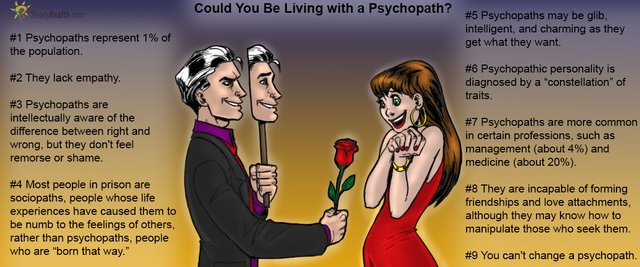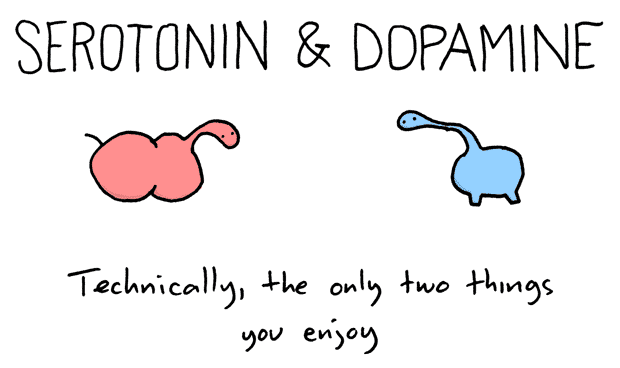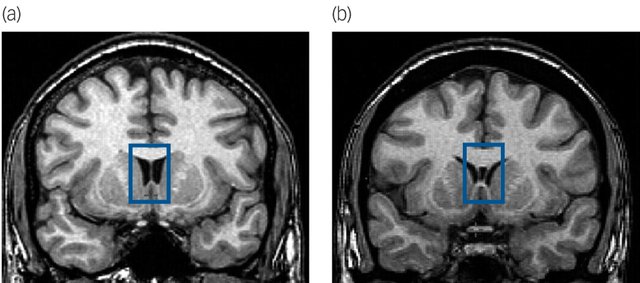Inside the mind of a psychopath

Criminals come in a variety of shapes and sizes, but the question of 'what makes a criminal' has intrigued psychologists for decades.
There is, of course, the nature nurture debate among criminologists, yet there is evidence to suggest that criminal brains are genetically prone to aggressive behavior.
Some criminals are the product of their environment ie. growing up in a bad neighborhood or coming from an abusive home, however, saying this, there are also a large number of criminals that have a relatively conflict free background. These criminals are born with defects in their brain which increase the likelihood of becoming a violent criminal. This also helps to explain how criminals can emerge from a loving upbringing.
We think of psychopaths as killers, loners, or people on the fringe of society. However, scientists suggest that they could be a colleague, a friend – or a spouse. We assume we know how to interact with other people, and we also assume that we have a pretty similar understanding between right and wrong. However, this is not true.

A psychopath is an individual with a mental health disorder. They come off as charming, manipulative and have no real emotion. They see people as objects which can be used to benefit their lives in one way or another. They are also gifted at hiding in plain sight and may appear inviting at face value. Psychopaths make up around 1% of the general population, which doesn't sound a lot, but they have the potential to be some of the most dangerous people on the planet.
So far, a number of studies show that serial killers are born not made. A psychopath generally shows reduced activity in an area towards the center of the brain called the orbital cortex thought to play a role in regulating our emotions and impulses as well as morality and aggression. A 'normal' scan would show normal brain activity levels, as shown by the yellow and green segments of the brain. As you can see, the other image appears black in the same location.
Chemical Imbalances

Chemical imbalances in the brain also create criminal behaviour. Neurotransmitters are chemicals in the brain that cause reactions, such as being aroused or triggering a memory. Research suggests that criminal minds have different levels of these neurotransmitters, meaning they react differently to hormones that make a person happy. Serotonin is the chemical that keeps people from acting aggressively when they are frustrated - when these levels are lower due to an imbalance, that equals a more aggressive individual that is likely to overreact in a violent manner.
Dopamine is another chemical that controls a person's happiness, and it is also the chemical that causes the feeling of love. This chemical level affects whether a person feels rewarded for an action. If dopamine levels increase significantly when they act in an aggressive manner, it will make them feel good and they will be likely to continue this behaviour.
The Corpus Collosum

This is the part of the brain that links the rational left and the irrational right side. In a psychopath, the fibers are longer and thinner than a normal human (Image B), causing the sides to communicate more often. Although this may sound like a good thing, it actually causes a few issues. While a 'normal' human brain is dominated by their rational left side, this increased communication causes criminals to be divided between the rational and irrational, leading to poorer judgment and an inability to see the consequences of their actions.
Although a handful of psychopaths become criminals, many of them become CEOs and top business professionals. There is a scary similarity between psychopaths and the traits of a 'good leader'. Their lack of empathy, charm, and ability to manipulate others seems to make them the perfect candidate.
As recruiters tend to focus on skills rather than personality features, this has lead to firms hiring “successful psychopaths”. These individuals may engage in unethical and illegal practices or have a toxic impact on colleagues. The Telegraph even stated that in Australia, 1 in 5 CEOs are psychopaths, which is the same rate among its prisoners.
Really, a psychopath could be anyone, even you may display some of the traits. there are telltale signs but watch this video to see a criminal psychopath in real life.
Hope you enjoyed reading about the mind of a psychopath! If you want to learn something new and interesting every day, give me a follow

Really interesting post! :)
Congratulations @lauren-jade! You have completed some achievement on Steemit and have been rewarded with new badge(s) :
Click on any badge to view your own Board of Honor on SteemitBoard.
For more information about SteemitBoard, click here
If you no longer want to receive notifications, reply to this comment with the word
STOP